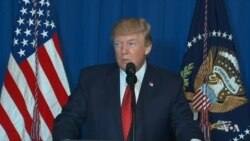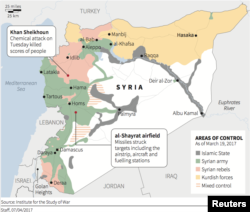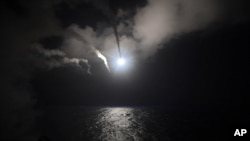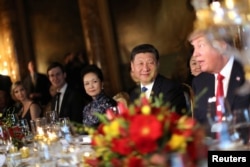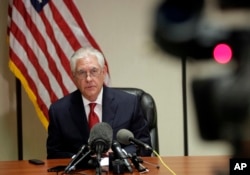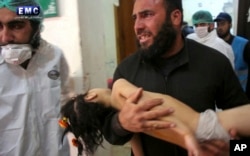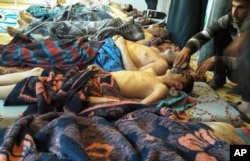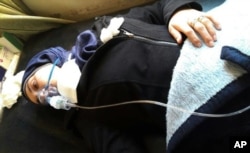The U.S. military fired a barrage of missiles into Syria early Friday in retaliation for a gruesome chemical weapons attack blamed on President Bashar al-Assad’s forces that killed about 100 civilians. It is the first direct U.S. assault on Syrian government forces.
The 59 Tomahawk cruise missiles were launched from the U.S. Navy destroyers USS Ross and USS Porter, which are deployed in the eastern Mediterranean.
U.S. forces are said to have targeted Shayrat Airfield in western Syria in retaliation for the chemical weapons attack that American officials believe Syrian government aircraft launched on a rebel-held town with a nerve gas, possibly sarin.
Sarin nerve gas
“We have a very high level of confidence” the strikes Tuesday were “carried out by aircraft of the Bashar al-Assad regime” and a high degree of confidence it was “sarin nerve gas,” U.S. Secretary of State Rex Tillerson said Thursday.
WATCH: Trump's prime-time address to the nation
U.S. officials said the missile strikes avoided depots where they believe sarin is being stored.
Pentagon spokesman Captain Jeff Davis said an initial assessment of the strikes found they had “severely damaged or destroyed Syrian aircraft and support infrastructure and equipment.”
In an address to the nation late Thursday, U.S. President Donald Trump said the strikes were ordered because it was in the “vital national security interest” of the U.S.
“On Tuesday Syrian President Bashar al-Assad launched a horrible chemical attack on innocent civilians using a deadly nerve agent. ... Tonight I ordered a targeted military strike on the airfield in Syria from where the chemical attack was launched,” Trump said.
“It is in this vital national security interest of the Untied States to prevent and deter the spread and use of deadly chemical weapons,” he added, calling the chemical weapons attack this week “very barbaric,” saying it had “choked out the lives of helpless men, women and children.”
Trump also called on all civilized nations to join the U.S. “in seeking an end to the slaughter and bloodshed in Syria.”
Syrian state TV called the U.S. strike an act of “aggression.” While a Turkish-based Syrian opposition group, the Syrian Coalition, welcomed the U.S. attack, saying it puts an end to an age of “impunity” and said the military action should continue.
Not a small strike
National Security Adviser H.R. McMaster, speaking to reporters late Thursday, said, “Obviously, the regime will retain a capacity to commit mass murder with chemical weapons beyond this airfield.”
He added: “This was not a small strike.”
In a statement released shortly after the U.S. airstrikes, Senators John McCain and Lindsey Graham said, “We salute the skill and professionalism of the U.S. Armed Forces who carried out tonight’s strikes in Syria. Acting on the orders of their commander-in-chief, they have sent an important message the United States will no longer stand idly by as Assad, aided and abetted by (President Vladimir) Putin’s Russia, slaughters innocent Syrians with chemical weapons and barrel bombs.”
Early Friday, Russia responded by saying its relations with Washington would likely deteriorate after the U.S. missile strikes. The deputy chairman of the defense committee said Moscow may terminate interaction with the U.S. military regarding Syria.
Russia also said it would seek an urgent meeting of the U.N. Security Council to discuss the U.S. “act of aggression” in Syria.
Chinese leader’s visit
The airstrike came as Trump entertained Chinese President Xi Jinping at the president’s Mar-a-Lago retreat.
Trump did not announce the attacks in advance, although he and other national security officials ratcheted up their warnings to the Syrian government throughout the day Thursday.
Tillerson, who is scheduled to travel to Russia next week, said the U.S. “coordinated very carefully with our international partners in terms of communicating with them around the world” about the military strike.
“I would tell you that the response from our allies, as well as the region and the Middle East has been overwhelmingly supportive of the action we have taken,” he added.
U.S. officials said they were not in communication with the Russian government before the airstrike. They were, however, in communication with Russian troops, who were present at the Shayrat airfield, before the military action was carried out.
Shift in policy
The surprise action marked a striking reversal for Trump, who warned as a candidate against the U.S. getting pulled into the Syrian civil war, now in its seventh year. But the president appeared moved by the video and photos of children killed in that chemical attack, calling it a “disgrace to humanity” that crossed “a lot of lines.”
“What Assad did is terrible. I think what happened in Syria is one of the truly egregious crimes, and it shouldn’t have happened and it shouldn’t be allowed to happen,” he told reporters on Air Force One en route to his talks in Florida with the Chinese president.
Last week, the White House backed away from the former Obama administration’s stance that Assad must be removed and focused instead on defeating the Islamic State insurgency. But on Thursday, that seemed to be changing.
Tillerson: Assad must go
While Trump did not say whether he now thought, in the wake of the gas attack, Assad should be driven from power, he did appear to endorse a new commitment to respond to the use of weapons of mass destruction.
Secretary of State Tillerson was more clear. He said Thursday that Assad had to go. Tillerson told reporters there was “no role for him to govern the Syrian people” in the future.
“The process by which Assad would leave is something that requires an international community effort, both to first defeat ISIS [Islamic State extremists] within Syria, to stabilize the Syrian country to avoid further civil war, and then to work collectively with our partners around the world through a political process that would lead to Assad leaving,” he said.
The six-year civil was had killed hundreds of thousands of people and displaced millions, contributing to the largest refugee crisis since the end of World War Two.
U.S. officials said this week there was no doubt the Syrian military was behind the apparent sarin gas attack on the rebel-held town of Khan Sheikhoun. The attack also sickened 350.
Television pictures showed horrifying scenes — men, women and children foaming at the mouth, convulsing uncontrollably and struggling to breathe. Some families, including babies, died in their beds.
Doctors showed that the pupils of the victims’ eyes were tiny pinpoints that did not react to light — a clear sign of sarin gas poisoning.
U.S. officials rejected Russian and Syrian claims the gas had come from a missile strike on a rebel-controlled warehouse where chemical weapons had been stockpiled.
UN discussions
At the United Nations, diplomats met earlier Thursday to discuss three draft resolutions responding to the gas attack. One put forward by the U.S., Britain and France, a competing draft put forward by Russia, and a third compromise draft from the 10 nonpermanent members of the Council.
Discussions ran late into the evening Thursday, but no consensus was reached and Council members departed, many looking tense.
Russia’s deputy U.N. Ambassador Vladimir Safronkov said “negative consequences” must be considered if the U.S. were to take unilateral military action.
“All responsibility, if military action occurred, will be on [the] shoulders of those who initiated such [a] doubtful and tragic enterprise,” Safronkov said in response to reporters’ questions.
“I was here with Hans Blix in 2003,” Sweden’s envoy Olof Skoog said, referring to the Swedish U.N. weapons inspector who told the Security Council that year that his team had found no evidence of weapons of mass destruction in Saddam Hussein’s Iraq. “We’re worried,” Skoog said, adding he had spoken to the U.S. ambassador about it.
Denies allegations
Syrian Foreign Minister Walid Moallem said his country did not use chemical weapons during airstrikes on Khan Sheikhoun. He insisted they would never be used, “even against terrorists.”
But Dr. Annie Sparrow, a public health specialist and a critical-care pediatrician at Mount Sinai Hospital in New York who has carried out many studies on Syria, said a “chemical cocktail” was used on the town.
She gave this chilling assessment to the VOA Turkish service: “It’s quite possible that Assad and Putin are using this ... as a kind of experiment to test out new combinations of lethal chemical weapons.” Sparrow said there was no way the Syrian rebels could have been responsible for the attack.
“Of course Russia and the Assad regime will deny this, because they know they are war crimes in the same way they deny attacks on hospitals and targeting civilians,” Sparrow said. “So they’re not going to fess up because they are war criminals conducting war crimes.”
VOA's Mehmet Sumer contributed to this report.






